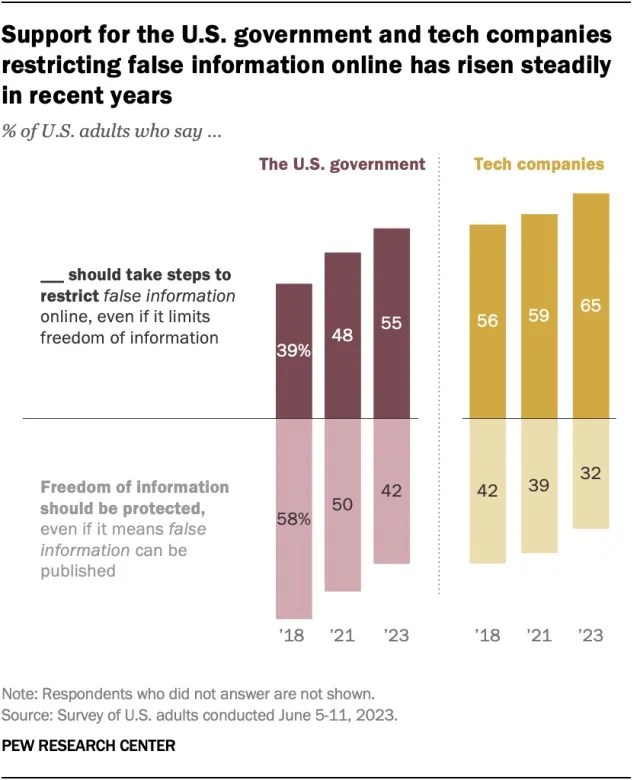👋 Welcome to the first edition of The Briefing! Every Thursday we update you on what’s happened and what’s coming in the news and information world – and what our data tells us about it. Not a subscriber yet? Sign up here!
In today’s email:
- Top story: OpenAI to commit $5 million to American Journalism Project
- New from Pew Research Center: How Americans view moderation of false information and extremely violent content online
- Under the radar: A look at The Trace, a nonprofit news outlet covering gun violence
- Looking ahead: Tucker Carlson to create a new media company
- Chart of the week: Support for U.S. government and technology companies restricting false information online has risen in recent years
🔥 Top story
OpenAI, the Microsoft-backed startup that developed ChatGPT, said on Tuesday that it would commit $5 million to the American Journalism Project to help local news outlets experiment with artificial intelligence.
According to a recent Center survey, among Americans who have heard about AI programs that can write news articles, a relatively small share (16%) describe this as a major advance for the news media, while 28% call it a minor advance. The largest share (45%) say it is not an advance at all.
🚨 New from Pew Research Center
A new Pew Research Center survey examines Americans’ attitudes toward restricting false information and extremely violent content online.
Key findings include:
- Most Americans support moderating false information online: 65% support tech companies doing so and 55% support the U.S. government taking these steps. These shares have increased since 2018.
- Americans are even more supportive of tech companies (71%) and the U.S. government (60%) restricting extremely violent content online.
- Democrats are more supportive than Republicans of tech companies and the U.S. government restricting extremely violent content and false information online. The gap between the parties’ support for restricting false information has grown substantially since 2018.
(If you are interested in how views of restricting false information online have changed over the past five years, keep reading for this week’s Chart of the Week!)
And if you would like to read more about Americans’ views of content moderation online, you can read the full analysis here.
🕵️ Under the radar
- A look at The Trace, a nonprofit news organization covering gun violence
- How a new Spanish-language media group could help former President Donald Trump
- Director of local news organization in Mexico murdered in Acapulco
- MuckRock and the Missouri Independent make all documents used to investigate St. Louis radioactive waste public
📅 Looking ahead
Former Fox News host Tucker Carlson is creating a new media company. Earlier this week, Carlson secured his first major investment: an ad deal worth more than $1 million with PublicSq. Carlson and his partner, former White House advisor Neil Patel, are looking to raise hundreds of millions of dollars to fund the company.
The new company’s potential relationship with Twitter would build on Carlson’s show on the platform. Twitter users often get news on the platform, though a recent Center survey shows that since Elon Musk has acquired Twitter, Democratic and Democratic-leaning users have become more concerned about inaccurate or misleading information.
📊 Chart of the week
Our chart this week comes from a new survey looking at how support for both the U.S. government and technology companies taking steps to restrict false information online has grown since 2018.

👋 That’s all for this week.
This edition of The Briefing was edited by Michael Lipka and Mark Jurkowitz, copy edited by Rebecca Leppert and compiled by Pew Research Center staff, including Naomi Forman-Katz, Jacob Liedke, Sarah Naseer, Christopher St. Aubin and Emily Tomasik.
Email us at journalism@pewresearch.org or fill out this two-question survey to tell us what you think of the newsletter!